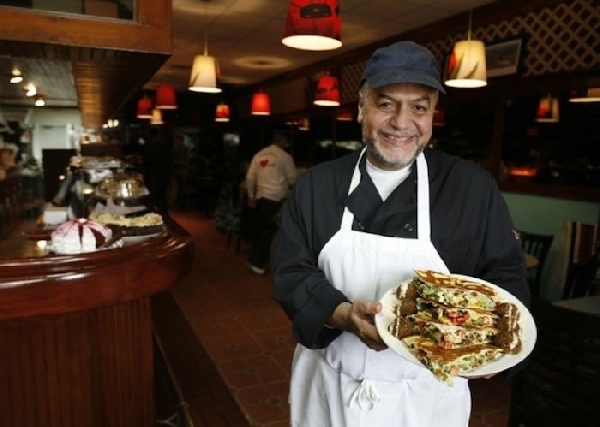
|
| Chef Taher Jaber |
DEARBORN — Do you get angry when your White friends add hummus where it doesn’t belong or use it as a dip for their chips?
I do.
I have often wondered if my draconian approach to Arabic food is irrational. Who is to say where hummus belongs? It is harmless if someone enjoys it with pizza or rice.
But the thing about food is that it is an integral component of our identity.
The other side of the argument is that the United States is a land of pluralism, where cultural elements of different communities inevitably intermingle, creating a diverse, unique way of life.
Pizza is the American version of a less exciting Italian pie. General Tso’s chicken, one of the most popular Chinese dishes in North America, is unfamiliar food to eaters in China.
And so it goes, a Dearborn bakery is serving seemingly Lebanese food that folks in the old country may find repulsively bizarre.
King’s Bakery is known for its manou-wich.
Not to be confused with Manwich, the canned beef sauce, Dearborn’s manou-wich is a sandwich rolled on a man’oushe, a cheese pie typically served as breakfast.
The bakery has a variety of manou-wiches — from Lebanese sausage (soujouk) to corned beef to eggs and bacon.
About two weeks ago, my coworkers and I tried a few of those manou-wiches for lunch. As a native of Lebanon, I found it unusual, as if my taste buds were telling me, “these ingredients are not supposed to be eaten together.”
Nevertheless, it was good.
Later in the evening, my colleague went on a tirade about the “blasphemous transgression” of infusing a breakfast staple with lunch meats. It dawned on him that the manou-wich is nothing but a sandwich made with a man’ooshe.
“If someone made this at home, you’d think they’re insane,” he fumed. “They bamboozled us with the name.”
Despite my coworker’s overzealous rejection to modifying Arabic food, creating innovative Middle Eastern cuisine is becoming a trend in Southeast Michigan.
La Fork, a new restaurant in West Dearborn, serves shawarma poutine, combining Canadian and Middle Eastern classics into one dish. Good Burger on Michigan Avenue has a kafta burger. Meanwhile, crepes and sushi are abundantly available at local Middle Eastern restaurants, while some mainstream grocery stores are selling tabouli made with quinoa instead of cracked wheat (borghoul).

|
| The manou-wich |
A cultural trait
Matt Stiffler, a professor of Arab American studies at the University of Michigan, said immigrant communities have a strong bond to their cuisine.
“Food for immigrant groups in the U.S. is the longest lasting cultural trait, when you’re talking about generations down the line,” he said.
Stiffler added that second and third generation Arab Americans may not speak Arabic, but they know the food, where to buy it and sometimes how to cook it.
“And it’s like that with all ethnic immigrant groups,” he said.
Stiffler said in the United States, people experience other cultures through their food. When enclaves of Arab immigrants formed, restaurants and grocery stores were the first businesses to appear.
He explained that immigrants could get anything from existing American establishments; but to buy and cook their own food, they had to found their own shops.
“If you go down Warren Avenue, the bulk of businesses is food-related,” he said.
Stiffler said as the community grows locally, U.S.-born Arabs are creating a market for American-style fusion that alters Middle Eastern cooking.
He said the Lebanese settled in Dearborn in large numbers in the 1970s after the start of the civil war in their home country.
“These immigrants’ children grew up in the 80s and 90s; they had American friends, ate American food,” Stiffler said.
He said some fusion happened for religious purposes and as a means of assimilation; halal products started emulating American foods that immigrants’ children wanted to eat, like their White pals.
“The fusion that we see happening today is influenced by the food culture in the United States,” he said. “You can’t turn on the TV without Chopped, Hell’s Kitchen — all these food shows where people are innovating cuisine and trying new things. A lot of the Arab American business owners are influenced by that. They see the fine, interesting things happening with food and they want to be a part of it because they’re just like everyone else.”
He added that American-born Arabs will not have the visceral reaction to taking a Lebanese staple and modifying it. “They think it’s kind of cool.”
Stiffler assured those worried about the disappearance of traditional Middle Eastern cooking here that the old way of food preparation will always be around.
He added that there is no 100 percent authentic Arabic cuisine here to begin with.
“You have to keep in mind that as Arabic food is sold in the United States, it’s already different than it is back home,” he said. “They’re using different oils and different fats and different ingredients, depending on what’s available.”
Changing up the game
Professor Stiffler is right. Food innovators confirmed that their improvised Arabic dishes are least appealing to recent immigrants.
Hassan Houssaiky, who created the manou-wich with his brother, hailed the fusion as creativity.
“Simple. It is a man’oushe sandwich,” he said.
He added that the manou-wich is popular among non-Arabs and young customers. Some older folks accuse him of “tokhbis”, an Arabic term referring to aimlessly (and unskillfully) mixing ingredients.
“I tell them, ‘Do you think a sub is tokhbis?’ It is bread and cheese and meat and vegetables.”
Asked if he is desecrating Arabic cuisine, Houssaiky said, “I’m changing up the game.”
Taher Jaber, the owner of Harmonie Garden in Detroit, started adding his own touch to Arabic delicacies long before it was cool.
His Midtown restaurant serves grilled falafels on hamburger buns, falafel on zaatar man’oushe and falafel with vegetarian chili (Flobby Joe), among other avant-garde dishes that some traditionalists may consider crimes against falafel.
The veteran chef started pursuing adventurous cooking ideas after starting his restaurant in 1993.
Detroit food enthusiasts, who may not have been fully introduced to Middle Eastern cuisine, embraced his unusual approach.
“They would come to Dearborn and ask for a ‘falaburger’, thinking it is Arabic food, and the waiters would get confused,” Jaber said. “Some restaurant owners laughed me off. They’d tell me, ‘Did you go crazy?’”
Despite the haters and criticism of old school eaters, Harmonie Garden is widely celebrated by the Detroit food community.
Reviewers have continuously heaped praise on the Syrian restaurant.
The Metro Times has anointed Jaber as the “falafel king.” Eater Detroit described the Flobby Joe as “a winning vegetarian burger option.”
“The food is really great and they have the best falafel in town,” one Yelp user wrote of the place.
Jaber said being in Detroit gave him an opportunity to change the basic recipes without facing skepticism.
He added that even people who grew up eating Arabic food are ready for change.
“If you get grape leaves in Lebanon, Syria, Jordan or Dearborn, it is the same taste,” he said. “People are bored of the same old food.”
Jaber said evolution is necessary in collective thinking as well as in cuisine.
“Arabic food has been stagnant for 200 years,” he said. “We shouldn’t be scared of change. Pluralism is needed both in the kitchen and in society.”
The chef added that even dishes that diners think of as Levantine classics are the result of fusion from multiple civilizations that settled in the region.
Bottom line, whether you are a food traditionalist or a progressive eater, it seems that foods like quinoa tabouli, falaburger and manou-wich are becoming an irreversible reality on the local Middle Eastern food scene.
Deal with it.






Leave a Reply